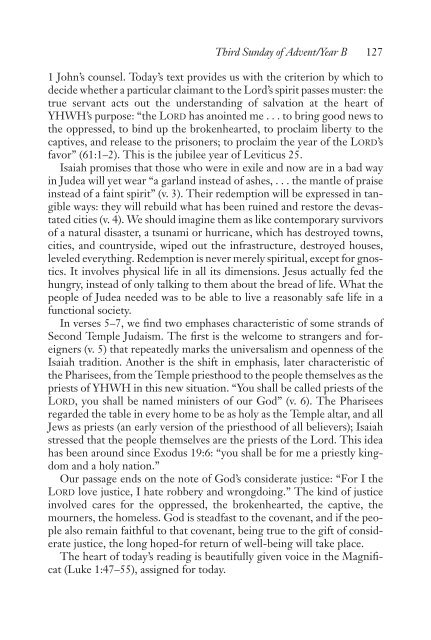000 Allen FMT (i-xxii) - The Presbyterian Leader
000 Allen FMT (i-xxii) - The Presbyterian Leader
000 Allen FMT (i-xxii) - The Presbyterian Leader
Create successful ePaper yourself
Turn your PDF publications into a flip-book with our unique Google optimized e-Paper software.
Third Sunday of Advent/Year B 127<br />
1 John’s counsel. Today’s text provides us with the criterion by which to<br />
decide whether a particular claimant to the Lord’s spirit passes muster: the<br />
true servant acts out the understanding of salvation at the heart of<br />
YHWH’s purpose: “the LORD has anointed me . . . to bring good news to<br />
the oppressed, to bind up the brokenhearted, to proclaim liberty to the<br />
captives, and release to the prisoners; to proclaim the year of the LORD’s<br />
favor” (61:1–2). This is the jubilee year of Leviticus 25.<br />
Isaiah promises that those who were in exile and now are in a bad way<br />
in Judea will yet wear “a garland instead of ashes, . . . the mantle of praise<br />
instead of a faint spirit” (v. 3). <strong>The</strong>ir redemption will be expressed in tangible<br />
ways: they will rebuild what has been ruined and restore the devastated<br />
cities (v. 4). We should imagine them as like contemporary survivors<br />
of a natural disaster, a tsunami or hurricane, which has destroyed towns,<br />
cities, and countryside, wiped out the infrastructure, destroyed houses,<br />
leveled everything. Redemption is never merely spiritual, except for gnostics.<br />
It involves physical life in all its dimensions. Jesus actually fed the<br />
hungry, instead of only talking to them about the bread of life. What the<br />
people of Judea needed was to be able to live a reasonably safe life in a<br />
functional society.<br />
In verses 5–7, we find two emphases characteristic of some strands of<br />
Second Temple Judaism. <strong>The</strong> first is the welcome to strangers and foreigners<br />
(v. 5) that repeatedly marks the universalism and openness of the<br />
Isaiah tradition. Another is the shift in emphasis, later characteristic of<br />
the Pharisees, from the Temple priesthood to the people themselves as the<br />
priests of YHWH in this new situation. “You shall be called priests of the<br />
LORD, you shall be named ministers of our God” (v. 6). <strong>The</strong> Pharisees<br />
regarded the table in every home to be as holy as the Temple altar, and all<br />
Jews as priests (an early version of the priesthood of all believers); Isaiah<br />
stressed that the people themselves are the priests of the Lord. This idea<br />
has been around since Exodus 19:6: “you shall be for me a priestly kingdom<br />
and a holy nation.”<br />
Our passage ends on the note of God’s considerate justice: “For I the<br />
LORD love justice, I hate robbery and wrongdoing.” <strong>The</strong> kind of justice<br />
involved cares for the oppressed, the brokenhearted, the captive, the<br />
mourners, the homeless. God is steadfast to the covenant, and if the people<br />
also remain faithful to that covenant, being true to the gift of considerate<br />
justice, the long hoped-for return of well-being will take place.<br />
<strong>The</strong> heart of today’s reading is beautifully given voice in the Magnificat<br />
(Luke 1:47–55), assigned for today.




